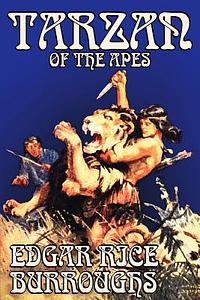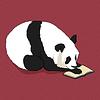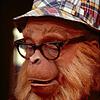Take a photo of a barcode or cover
Initial Thoughts Upon Finishing
I really enjoyed this! I have a stunning edition of the first three novels bound together and I can't wait to continue reading - this finishes on such a cliff hanger! Despite this taking me the best part of a year to pick through (honestly, if that isn't the definitely of a short attention span then I don't know what is) I loved the original tale of Tarzan. This is my favourite Disney movie so it was really interesting to see where the story had come from and wow! It's very different. Loved it!

Tarzan of the Apes
I think the thing that blew my mind the most about this book is the fact that it was written in 1912 - at times I found it really hard to imagine Burroughs sitting at a desk so long ago putting pen to paper and creating this fantastical story. It amazes me!

This original story of Tarzan is nothing like you’re expecting it to be if you’ve only ever seen remakes and retellings. In my opinion, Tarzan is the second most inaccurately retold story following Frankenstein - and it’s such a shame! But let’s come back to retellings later. The book will pull the rug out from under your feet by introducing Clayton as Tarzan’s father - whilst he is not the Clayton we know from Disney, it was certainly a shock to see such a hated character imposed on top of one we knew to be loving.
We are introduced to Tarzan’s character and follow his journey of growing up with the Apes through to meeting Jane and the rest. I won’t tell you much more than that, but Jane is definitely the most accurately represented character in movies, etc. It’s really interesting to explore as a story because so much of it was completely new to me and Tarzan himself is way more barbaric and gross (which makes a lot more sense).
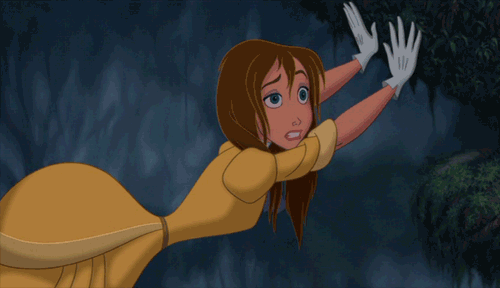
Is the Original Actually Good?
Well, if you couldn’t tell from my previous enthusiasm, the short answer is: yes. I highly recommend this book if you’re a fan of Tarzan and interested in seeing how the original story unfolds. I am, right now, about to keep reading and go into book two because I can’t wait to see what Tarzan does next.

This is no easy fairytale story as Disney would have you believe. Yes there’s romance, and yes Tarzan is a gentleman at heart, but the aristocratic fanfare that Jane has to deal with is very real and it’s never going to be as simple and just swinging off into the trees with her Ape man.

My only wish is that someone made a movie adaptation of this accurately. I think it’s a fantastic story and there’s no need whatsoever to change things!

A Unique Classic
I always find myself shying away from classic books; they’re intimidating and the language is sometimes so ambiguous that I have to guess at what is going on. Thankfully, Tarzan isn’t like that at all. I particularly loved it when a mockery of the male characters was made regarding their ignorance about Africa. Such as when Professor Porter comes across a lion:

I was curious trying to analyse the racist and sexist elements of this book, too. I wasn’t sure what to expect from a book that could so easily lend itself to horrible racism against tribal African people considering the book itself is over 100 years old. From my first, disjointed read of this book I actually didn’t find anything too politically incorrect.

I suppose it’s helped by the fact that Burroughs is clearly neither overtly one or the other (I presume from his writing). But nonetheless, I didn’t cringe at any comments, descriptions and so forth when Tarzan comes across African people. But I did find myself confused over how I should feel about the tribe that Tarzan repeatedly encounters - are they supposed to be portrayed as evil? Good? Neither?
The thing I found most frustrating was the Jane was treated by the men. She wasn’t abused, no. It was just painfully sexist at times - but in a way that had me angry at the characters, not author. I loved how the frustrations of being a woman in this time come through so poignantly in her character in the book - opposed to the giddy representation we get in the Disney film. Kudos to Burroughs for nailing this representation on the head. I did, however, raise an eyebrow once or twice over Esmeralda’s character (a black family servant) whose purposed seemed to be to make up for the lack of painful stereotypes present elsewhere in the book.
Summary
Overall this was a solid 4 star read for me! As I said, I can’t wait to see where the story goes and I do hope that Jane and Tarzan get their happy ending in this book as in Disney. I’m hoping we’ll see more of D’Arnot’s character, too, because he’s a precious little gem. I definitely recommend this book and I’d give it as present to someone over 15 years!

Happy reading!
I really enjoyed this! I have a stunning edition of the first three novels bound together and I can't wait to continue reading - this finishes on such a cliff hanger! Despite this taking me the best part of a year to pick through (honestly, if that isn't the definitely of a short attention span then I don't know what is) I loved the original tale of Tarzan. This is my favourite Disney movie so it was really interesting to see where the story had come from and wow! It's very different. Loved it!

Tarzan of the Apes
I think the thing that blew my mind the most about this book is the fact that it was written in 1912 - at times I found it really hard to imagine Burroughs sitting at a desk so long ago putting pen to paper and creating this fantastical story. It amazes me!

This original story of Tarzan is nothing like you’re expecting it to be if you’ve only ever seen remakes and retellings. In my opinion, Tarzan is the second most inaccurately retold story following Frankenstein - and it’s such a shame! But let’s come back to retellings later. The book will pull the rug out from under your feet by introducing Clayton as Tarzan’s father - whilst he is not the Clayton we know from Disney, it was certainly a shock to see such a hated character imposed on top of one we knew to be loving.

We are introduced to Tarzan’s character and follow his journey of growing up with the Apes through to meeting Jane and the rest. I won’t tell you much more than that, but Jane is definitely the most accurately represented character in movies, etc. It’s really interesting to explore as a story because so much of it was completely new to me and Tarzan himself is way more barbaric and gross (which makes a lot more sense).

Is the Original Actually Good?
Well, if you couldn’t tell from my previous enthusiasm, the short answer is: yes. I highly recommend this book if you’re a fan of Tarzan and interested in seeing how the original story unfolds. I am, right now, about to keep reading and go into book two because I can’t wait to see what Tarzan does next.
"No," replied Tarzan. "Only a fool performs any act without reason."
~ Tarzan

This is no easy fairytale story as Disney would have you believe. Yes there’s romance, and yes Tarzan is a gentleman at heart, but the aristocratic fanfare that Jane has to deal with is very real and it’s never going to be as simple and just swinging off into the trees with her Ape man.

My only wish is that someone made a movie adaptation of this accurately. I think it’s a fantastic story and there’s no need whatsoever to change things!

A Unique Classic
I always find myself shying away from classic books; they’re intimidating and the language is sometimes so ambiguous that I have to guess at what is going on. Thankfully, Tarzan isn’t like that at all. I particularly loved it when a mockery of the male characters was made regarding their ignorance about Africa. Such as when Professor Porter comes across a lion:
"Most reprehensible, most reprehensible," exclaimed Professor Porter, with a faint trace of irritation in his voice. "Never, Mr. Philander, never before in my life have I known one of these animals to be permitted to roam at large from its cage. I shall most certainly report this outrageous breach of ethics to the directors of the adjacent zoological garden."
~ Professor Porter

I was curious trying to analyse the racist and sexist elements of this book, too. I wasn’t sure what to expect from a book that could so easily lend itself to horrible racism against tribal African people considering the book itself is over 100 years old. From my first, disjointed read of this book I actually didn’t find anything too politically incorrect.

I suppose it’s helped by the fact that Burroughs is clearly neither overtly one or the other (I presume from his writing). But nonetheless, I didn’t cringe at any comments, descriptions and so forth when Tarzan comes across African people. But I did find myself confused over how I should feel about the tribe that Tarzan repeatedly encounters - are they supposed to be portrayed as evil? Good? Neither?
"I love you, and because I love you I believe in you. But if I did not believe, still should I love. Had you come back for me, and had there been no other way, I would have gone into the jungle with you - forever."
~ Jane

The thing I found most frustrating was the Jane was treated by the men. She wasn’t abused, no. It was just painfully sexist at times - but in a way that had me angry at the characters, not author. I loved how the frustrations of being a woman in this time come through so poignantly in her character in the book - opposed to the giddy representation we get in the Disney film. Kudos to Burroughs for nailing this representation on the head. I did, however, raise an eyebrow once or twice over Esmeralda’s character (a black family servant) whose purposed seemed to be to make up for the lack of painful stereotypes present elsewhere in the book.
"You are judging him according to your own standards, gentlemen," said Jane. "An ordinary white man such as any of you - pardon me, I did not mean just that - rather, a white man above the ordinary in physique and intelligence could never, I grant you, have lived a year alone and naked in this tropical jungle . . . "
~ Jane

Summary
Overall this was a solid 4 star read for me! As I said, I can’t wait to see where the story goes and I do hope that Jane and Tarzan get their happy ending in this book as in Disney. I’m hoping we’ll see more of D’Arnot’s character, too, because he’s a precious little gem. I definitely recommend this book and I’d give it as present to someone over 15 years!

Happy reading!
To say this book has not aged well would be a massive understatement. Not only is it horrifically racist and classist, the ending is just awful! I am a compulsive finisher - there are virtually no books that I've started that I haven't (eventually) finished. This just got worse and worse and by the time I got to the end I was mad I'd wasted reading time on it.
The idea that a child raised by ape-people could teach himself to read and write fluent English by using a handful of books left behind by his dead parents is laughable. But there were also so many instances of overt racism and classism as to make this book immensely uncomfortable to read.
Here are two examples that stood out to me.
"thus hereditary instinct, ages old, usurped the functions of his untaught mind and saved him from transgressing a worldwide law of whose very existence he was ignorant." Even though the ape-men and the black tribe (don't even get me started on how they're portrayed) are cannibals, Tarzan's white, aristocratic birth makes him innately more moral.
"It was a stately and gallant little compliment performed with the grace and dignity of utter unconsciousness of self. It was the hall-mark of his aristocratic birth, the natural outcropping of many generations of fine breeding, an hereditary instinct of graciousness which a lifetime of uncouth and savage training and environment could not eradicate."
Anyhoo. I will not be wasting any more of my time reading any more of the Tarzan books.
The idea that a child raised by ape-people could teach himself to read and write fluent English by using a handful of books left behind by his dead parents is laughable. But there were also so many instances of overt racism and classism as to make this book immensely uncomfortable to read.
Here are two examples that stood out to me.
"thus hereditary instinct, ages old, usurped the functions of his untaught mind and saved him from transgressing a worldwide law of whose very existence he was ignorant." Even though the ape-men and the black tribe (don't even get me started on how they're portrayed) are cannibals, Tarzan's white, aristocratic birth makes him innately more moral.
"It was a stately and gallant little compliment performed with the grace and dignity of utter unconsciousness of self. It was the hall-mark of his aristocratic birth, the natural outcropping of many generations of fine breeding, an hereditary instinct of graciousness which a lifetime of uncouth and savage training and environment could not eradicate."
Anyhoo. I will not be wasting any more of my time reading any more of the Tarzan books.
A Princess of Mars is one of my favorite novellas. I thought since I loved the Barsoom series so much, I should attempt to read Tarzan and the Apes. It's a little silly, but Tarzan has always been one of my favorite movies (Disney version).
And. . .I'm just not falling in love with the writing or any of the characters in this novella, which is so unlike me and Burroughs. I love that guy. I love the Barsoom series.
I might give up on this and return to John Carter and Dejah Thoris.
And. . .I'm just not falling in love with the writing or any of the characters in this novella, which is so unlike me and Burroughs. I love that guy. I love the Barsoom series.
I might give up on this and return to John Carter and Dejah Thoris.
Es en serio?!? Porqué tarde tanto en leerlo?
La historia no era lo que esperaba y definitivamente eso es lo mejor que pudo haber pasado. Teniendo como referencias las adaptaciones, me alegra haber descubierto que realmente cambiaron mucho de la historia original.
No conozco mucho de la literatura de inicios del siglo XX, probablemente la manera en la que el autor ilustra un personaje femenino sea normal de la época...tengo que leer mas de esto para averiguarlo pues es lo único que me molestó...pocas veces.
De todas formas, aquí solo Tarzan es el protagonista, nadie más. Se trataba de entender y ver la forma en la que el descubría su origen, su naturaleza; es un hombre tan sencillo e inteligente a la vez que puede ver los problemas y sus soluciones fácilmente, cosa que es difícil hacer para alguien que tiene tantas preocupaciones y responsabilidades como las "personas civilizadas". Te hace apreciarlo y admirarlo por completo.
Me sorprendí absoluta y completamente con cada parte de la historia. Definitivamente lo recomiendo. Y me voy a leer el siguiente :)
La historia no era lo que esperaba y definitivamente eso es lo mejor que pudo haber pasado. Teniendo como referencias las adaptaciones, me alegra haber descubierto que realmente cambiaron mucho de la historia original.
No conozco mucho de la literatura de inicios del siglo XX, probablemente la manera en la que el autor ilustra un personaje femenino sea normal de la época...tengo que leer mas de esto para averiguarlo pues es lo único que me molestó...pocas veces.
De todas formas, aquí solo Tarzan es el protagonista, nadie más. Se trataba de entender y ver la forma en la que el descubría su origen, su naturaleza; es un hombre tan sencillo e inteligente a la vez que puede ver los problemas y sus soluciones fácilmente, cosa que es difícil hacer para alguien que tiene tantas preocupaciones y responsabilidades como las "personas civilizadas". Te hace apreciarlo y admirarlo por completo.
Me sorprendí absoluta y completamente con cada parte de la historia. Definitivamente lo recomiendo. Y me voy a leer el siguiente :)
I really enjoyed this book, much to my surprise! An easy-to-read true adventure. A bit dated in portrayals of the natives--but the English don't get off any easier. The parts about Tarzan learning to read are interesting, as are the times when we get insights into the apes' (admittedly limited) thoughts. Just a clever and fun story.
Here's a case of a book being pretty much overwhelmed by its own success in popular culture. From Johnny Weissmuller to "Me Tarzan, you Jane" to being Disney-fied, everyone knows the story of Tarzan. Or at least, some version of it. The thing about reading the book is that you might find out the version you know didn't come from the book. I'll admit I'm not too familiar with the various adaptations of the story, but I didn't quite expect what I got.
Lord Greystoke and his young, pregnant wife are marooned on the coast of Africa after a mutiny on board the ship on which they were traveling. They make a reasonably comfortable life for themselves on the isolated beach, just outside the beginning of a deep jungle. The baby is born, and when by the time he's just over a year old, both his parents are dead and he's been stolen by an ape who is grieving for her own lost baby. The rest of the book has to do with Tarzan's place as an outsider with the tribe of apes, and his experiences with native tribes and eventually, the first white people he sees.
Burroughs' writing is serviceable, and the plot will keep you going even in the midst of completely unbelievable coincidences and other developments - that stretch of beach is apparently the happening place for maroonings, for example, and Tarzan is a super-genius who can teach himself to read without ever having been introduced to the concept of a written language. The racism, sexism, classism and support for imperialism that reflect his time are a little hard to swallow for the modern reader. Jane, as a woman, "was created to be protected." Tarzan isn't disturbed by the natives' cannibalism until their potential victim is a white man. Tarzan instinctively reacts to Jane's courtesies in kind as "the hall-mark of his aristocratic birth, the natural outcropping of many generations of fine breeding." Jane's black servant is a malaprop-spouting, eye-rolling, fainting-at-the-drop-of-a-hat stereotype. Even with those caveats, it's worth reading just to know where the story really began.
Recommended for: fans of swashbucklers and adventure, anyone who can hear the Tarzan yell in their head (which must be everyone), people who don't mind occasionally shaking a fist at the attitudes in the book.
Quote: "Jane Porter -- her lithe, young form flattened against the trunk of a great tree, her hands tight pressed against her rising and falling bosom, and her eyes wide with mingled horror, fascination, fear and admiration -- watched the primordial ape battle with the primeval man for possession of a woman -- for her."
Lord Greystoke and his young, pregnant wife are marooned on the coast of Africa after a mutiny on board the ship on which they were traveling. They make a reasonably comfortable life for themselves on the isolated beach, just outside the beginning of a deep jungle. The baby is born, and when by the time he's just over a year old, both his parents are dead and he's been stolen by an ape who is grieving for her own lost baby. The rest of the book has to do with Tarzan's place as an outsider with the tribe of apes, and his experiences with native tribes and eventually, the first white people he sees.
Burroughs' writing is serviceable, and the plot will keep you going even in the midst of completely unbelievable coincidences and other developments - that stretch of beach is apparently the happening place for maroonings, for example, and Tarzan is a super-genius who can teach himself to read without ever having been introduced to the concept of a written language. The racism, sexism, classism and support for imperialism that reflect his time are a little hard to swallow for the modern reader. Jane, as a woman, "was created to be protected." Tarzan isn't disturbed by the natives' cannibalism until their potential victim is a white man. Tarzan instinctively reacts to Jane's courtesies in kind as "the hall-mark of his aristocratic birth, the natural outcropping of many generations of fine breeding." Jane's black servant is a malaprop-spouting, eye-rolling, fainting-at-the-drop-of-a-hat stereotype. Even with those caveats, it's worth reading just to know where the story really began.
Recommended for: fans of swashbucklers and adventure, anyone who can hear the Tarzan yell in their head (which must be everyone), people who don't mind occasionally shaking a fist at the attitudes in the book.
Quote: "Jane Porter -- her lithe, young form flattened against the trunk of a great tree, her hands tight pressed against her rising and falling bosom, and her eyes wide with mingled horror, fascination, fear and admiration -- watched the primordial ape battle with the primeval man for possession of a woman -- for her."
adventurous
I went though a pulp fiction phase, so I had to read Edgar Rice Burroughs. Tarzan has become a cultural icon. We understand his struggle to reconcile the behavior of man with the that of the animals, because inside all of us is that primal being yearning to break free. I enjoy Burroughs writing style. Although it may be dated, he writes with great heart. I only wish I had discovered him when I was a child, reading books in the boughs of an apple tree.
"Tarzan of the Apes" is a lot like eating Oreos.
On one hand, you have something delicious, lacking nutritional value but also vegan so not THAT bad, right? On the other hand, as you shovel your face full of Oreos, orangutans are dying so that people can harvest the palm oil that goes into those bad boys. So you have three choices. You can eat the Oreos without guilt despite knowing about the environmental effects, eat them with guilt and allow your enjoyment of them to be dampened by your conscience, or you can choose to abstain all together.
In this case, "Tarzan" is the Oreos and racism is the palm oil. And boy, oh boy, did Edgar Rice Burroughs use lots and lots of racism in his Tarzan recipe.
Like Oreos, this book has little to no nutritional value. You will learn absolutely nothing from this novel, and in fact might walk away with some misinformation if you're not careful. The concept of a human raised by animals growing to fit into human society based on his superior intellect and lordly genetics is highly ridiculous, as is the concept of said human developing super human strength. Tarzan is the male equivalent of a Mary Sue - his defining character trait is his perfection.
The pure fantasy of it all is not necessarily a bad thing. While I was reading, I could imagine the glee that a young Victorian boy might have felt reading about all the adventures of Tarzan of the Apes. Tarzan is a super hero before super heroes were a thing. He looks normal, but he isn't. He performs feats of daring do, and always does the "right" thing, and never loses a fight no matter how close he gets to it.
This book is pure, pulpy fun, but let's not ignore the elephant in the room (and I don't mean Tantor). This book is racist as all hell, even for the time it was written. The entire concept of Tarzan as a character is that he is able to do everything that he does ONLY because he is white; and not just white, but LORDLY white. The socioeconomic class that he was born into, despite never having been raised within it, is given as the excuse for every positive part of his character. There is even a passage where Jane, knowing approximately zero about this jungle hopping monkey man, knows that she can trust him because of his....white man's face. Like really? What is that?
In addition to a hard-on for eugenics, Edgar Rice Burroughs seems hell bent on degrading every single non-white character. Esmeralda, who might be the only non-white character that actually speaks, is a caricature of idiocy. She faints constantly, misuses words, and generally provides nothing to the story except someone to laugh at in the midst of the white people. The characterization of the African indigenous peoples, too, is extremely offensive. They are portrayed as savages, made into cannibals for the pure shock value of it, and made the butt of Tarzan's jokes. They are dehumanized and viewed as needlessly violent; all the while Tarzan is swinging around trees literally lynching them without a shred of guilt.
With all of that said, I had a hard time picking a rating for this book because truthfully I enjoyed a bit of it. It was mindless fun to read about the impossible feats of this strange jungle man, and truthfully I wouldn't mind reading the next in the series to find out what happens next. So I guess in this moral quandary I chose option two; eat the Oreo and feel guilty about it. With that said, I'm not exactly about to go around recommending Oreos to everyone I pass by, either. It's one thing to eat an Oreo, and quite another to become an Oreo salesman.
On one hand, you have something delicious, lacking nutritional value but also vegan so not THAT bad, right? On the other hand, as you shovel your face full of Oreos, orangutans are dying so that people can harvest the palm oil that goes into those bad boys. So you have three choices. You can eat the Oreos without guilt despite knowing about the environmental effects, eat them with guilt and allow your enjoyment of them to be dampened by your conscience, or you can choose to abstain all together.
In this case, "Tarzan" is the Oreos and racism is the palm oil. And boy, oh boy, did Edgar Rice Burroughs use lots and lots of racism in his Tarzan recipe.
Like Oreos, this book has little to no nutritional value. You will learn absolutely nothing from this novel, and in fact might walk away with some misinformation if you're not careful. The concept of a human raised by animals growing to fit into human society based on his superior intellect and lordly genetics is highly ridiculous, as is the concept of said human developing super human strength. Tarzan is the male equivalent of a Mary Sue - his defining character trait is his perfection.
The pure fantasy of it all is not necessarily a bad thing. While I was reading, I could imagine the glee that a young Victorian boy might have felt reading about all the adventures of Tarzan of the Apes. Tarzan is a super hero before super heroes were a thing. He looks normal, but he isn't. He performs feats of daring do, and always does the "right" thing, and never loses a fight no matter how close he gets to it.
This book is pure, pulpy fun, but let's not ignore the elephant in the room (and I don't mean Tantor). This book is racist as all hell, even for the time it was written. The entire concept of Tarzan as a character is that he is able to do everything that he does ONLY because he is white; and not just white, but LORDLY white. The socioeconomic class that he was born into, despite never having been raised within it, is given as the excuse for every positive part of his character. There is even a passage where Jane, knowing approximately zero about this jungle hopping monkey man, knows that she can trust him because of his....white man's face. Like really? What is that?
In addition to a hard-on for eugenics, Edgar Rice Burroughs seems hell bent on degrading every single non-white character. Esmeralda, who might be the only non-white character that actually speaks, is a caricature of idiocy. She faints constantly, misuses words, and generally provides nothing to the story except someone to laugh at in the midst of the white people. The characterization of the African indigenous peoples, too, is extremely offensive. They are portrayed as savages, made into cannibals for the pure shock value of it, and made the butt of Tarzan's jokes. They are dehumanized and viewed as needlessly violent; all the while Tarzan is swinging around trees literally lynching them without a shred of guilt.
With all of that said, I had a hard time picking a rating for this book because truthfully I enjoyed a bit of it. It was mindless fun to read about the impossible feats of this strange jungle man, and truthfully I wouldn't mind reading the next in the series to find out what happens next. So I guess in this moral quandary I chose option two; eat the Oreo and feel guilty about it. With that said, I'm not exactly about to go around recommending Oreos to everyone I pass by, either. It's one thing to eat an Oreo, and quite another to become an Oreo salesman.
The racial and gender politics involved in this book date it, of course, and occasionally made me wince, but it was a fantastic adventure yarn that I truly had a hard time putting down, and much different than I was expecting thanks to years of TV and movie adaptations that use the names and jungle setting but little else. Reading this, it's easy to see how Tarzan captured the imagination enough to keep him going in public consciousness for an entire century now. If you only know the monosyllabic dude in the loincloth from the movies, you really owe it to yourself to give Burroughs's original story a try (and beyond, seeing as this ends on a frustrating note that's driving me to the second book ASAP to see how it's resolved). Not enlightening by any means, but entertaining to be sure.
